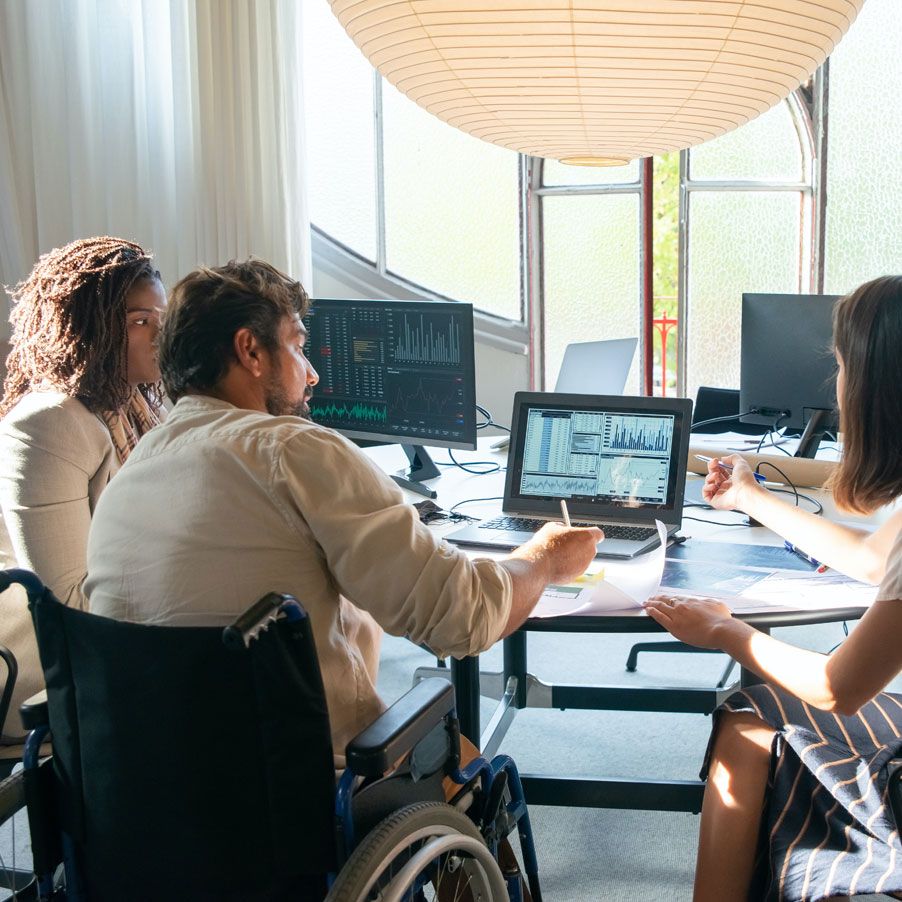In November, two editors reached out to me about writing an article on Sia’s upcoming film, Music, and the autistic representation in the trailer. Due to the timeliness of the trailer’s release and subsequent controversy, I needed to turn in my first draft later that same day. By the time I was sitting down to dinner that night, the article had been edited and published, and over 1,000 people had retweeted my post sharing it.
“This is why it’s so important to hire disabled writers,” one of my editors said when she shared the article on Instagram. “Within hours, we’ve published a nuanced take on this story.”
Many other publications had non-disabled and non-autistic journalists cover the story, instead opting to assign it to an available editor or staff writer. Some of those articles were missing the nuance that my editor mentioned, and all of them were missing something invaluable: Personal experience.
Here are some of the reasons why you should hire disabled freelancers.
We have personal experience with disability and chronic illness
Having personal experience with a topic isn’t always a requirement for journalists and other creators—throughout history, people have reported on wars and tragedy that they weren’t involved in. But personal experience often helps, particularly when that experience is belonging to the marginalized group being written about. Personal experience is a bonus in every field, particularly in any storytelling field, including journalism, filmmaking, screenwriting, novel writing, game development, theatre, music, performance art, and more.
As Wendy Lu wrote for the Columbia Journalism Review, disability stories often focus too much on emotion and not any of the other eight news values (proximity, timeliness, prominence, magnitude, conflict, oddity, impact, and emotion). That’s what leads to the same types of videos going viral over and over again, like a wheelchair user standing up to dance at their wedding or a person with Down syndrome going to prom. All of this amounts to not much more than inspiration porn, a term coined by the late disability activist Stella Young. Essentially, disabled people are reduced to just being inspirational to others because we simply exist with disabilities. We’re inspiring because we wake up in the morning. We’re inspiring for brushing our teeth, graduating high school, and pursuing a career.
When you hire disabled journalists, filmmakers, and creators to helm projects, disability stories—both news stories and fiction—become more nuanced. Disabled creators breathe life into these stories, and see beyond the boxes that society has put us in. We know that we’re more than just addressing the question, “What happened to you?” constantly, and we know what stories about disability are being ignored and underappreciated.
The Disabled Writers database, founded in 2017 as a co-partnership between s.e. smith, Vilissa Thompson, and Alice Wong, exists to help bridge this gap in journalism and media, and is a great resource for finding disabled writers who are available for projects.
We’re adept problem-solvers
You may be thinking, “The project I’m hiring for is purely technical and involves no storytelling, so why should I hire a disabled freelancer for that?”
This path of thinking ignores the many varied skills and talents that disabled people bring to the table. Disabled people exist in every industry—we’re not just journalists and actors, we’re also programmers, accountants, proofreaders, marketing managers, teachers, and customer service agents.
Generally speaking, disabled people have an edge over non-disabled people: We’re adaptive and creative problem-solvers because we’ve always had to be, just to navigate an inaccessible world. I can’t tell you how many times I’ve called a restaurant first to make sure it’s wheelchair accessible (I’m not a wheelchair user but several of my friends are), or contacted an event organizer to make sure I can get a reserved seat because I can’t stand in long lines. Almost every disabled person has had to advocate for themselves and figure out solutions to complex problems just to do the same things everyone else takes for granted, like taking the train to see a play, applying to college, or renting our first apartment.
Almost every disabled person has had to advocate for themselves and figure out solutions to complex problems just to do the same things everyone else takes for granted.
Your project, regardless of what industry it’s in, can absolutely benefit from our problem-solving. Many of us are also excellent at advocating and negotiating, following up (if you’ve ever had to follow up on your own health care for the hundredth time, you get it), and staying organized. People often say that having a disability is like a full-time job in itself, and that’s often just because the world is inaccessible and not built for disabled people.
We’re often among the first to pioneer new ways
Disabled people are often pioneers, especially in work—we were working from home and freelancing before the pandemic! A 2019 FlexJobs survey showed that one-third of workers have left a job because their employer didn’t offer flexible work policies like working from home or flexible scheduling, and according to SHRM’s Research on Navigating COVID-19: Return to the Workplace, five percent of organizations are more likely to hire individuals with disabilities than they were before the pandemic. According to the U.S. Bureau of Labor Statistics, disabled people are also almost twice as likely to be self-employed than nondisabled people.
I began working from home full-time in 2017, after I was diagnosed with Ehlers-Danlos syndrome following months of difficulty with work and school because of my symptoms. I didn’t see the solution until it was right in front of me: When I got a remote job offer and began working fully remotely, I realized how beneficial it was for my health and for my productivity. I became a more efficient employee and I was taking care of myself. I realized just how much little things like my commute, my access to different food options (there wasn’t much I could cook with just one company microwave), my ability to dress comfortably (it’s so much easier to work in pajamas on a high pain day), and my ability to customize my workspace (ergonomic chair, weighted blanket for flare-ups, being able to elevate my feet for part of the day) were affecting my work when they were no longer an issue.
In many ways, disabled people are pioneers at work. We’ve been working from home out of necessity, so we know all the best tips. My friends all came to me for advice once they started working from home, and a few people who have found they love it have also come to me for advice on how to convince their boss to let them keep doing it. We’ve adapted our workspaces. We’ve worked flexible schedules, and we’ve freelanced. A lot of the time, we’ve done these things out of necessity, because the alternative wasn’t accessible or this was the best option.
Disabled people are valuable freelancers and employees with years of expertise to share, and we’re ready to teach everyone else.




